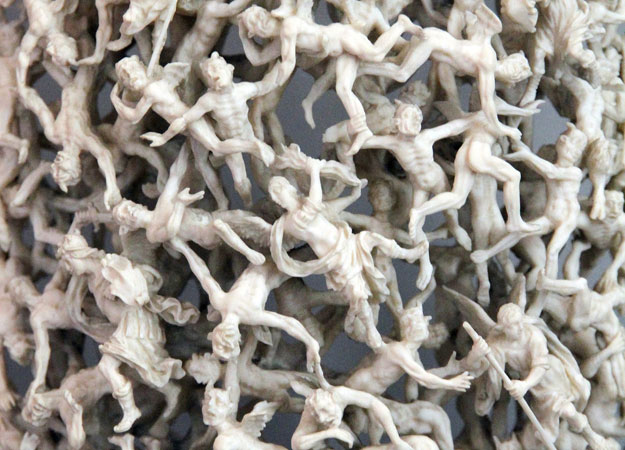
One night the other week I was reading a recent issue of National Geographic while I ate dinner (as is my nerdy custom), and I was struck by a passage in an article about the conflict in Central African Republic. It was the account of a teenage girl who had been sexually abused by a French peacekeeping soldier. The girl and her mother had taken refuge at the Bangui airport, which was protected from feuding militias by peacekeeping troops. She claimed the soldier promised her food in exchange for sex and threatened to beat her if she cried; the girl was five months pregnant at the time of her interview.
It’s probably naive of me to be shocked by this story, which I’m sure is no surprise to those who avidly protest human rights abuses (and indeed, I’ve found with some quick research that these allegations are all too frequent), but it stopped me in my tracks. The idea of exploiting someone who is relying on you for protection is so sickening that I struggle to wrap my mind around it.
I tried to put myself in the position of the girl. She said at first the soldier was friendly. I imagine the confusion and then dread as the situation changed and she realized what she would have to do. I imagine how during and after such an encounter, a person must feel like no one in the world is looking out for them, and that the world is full of unpredictable violence and danger.
I tried to put myself in the position of the solider. What would motivate someone to threaten and sexually exploit a teenage girl, especially one who is under your protection? Notwithstanding the possibility that the perpetrator was a psychopath, I could only think of two other scenarios. The first is if the soldier was embedded in a culture where this type of behavior was accepted or encouraged by his peers. He did it because others did it. Initial hesitation may have been overshadowed by assurance that it would be enjoyable and without consequences. The other scenario is that the soldier actively resented the Central Africans he had been sent to protect and believed himself to be superior in some way, and that he was justified in exploiting the girl. He may have even felt his behavior reinforced the power structure, reminding the Central Africans who was really in charge.
Both of these scenarios boil down to a common theme: the soldier viewed the girl as less than. Either because she was African, a female, or both, the soldier felt it was acceptable to threaten and abuse her, because she was somehow lower, different, other.
In the past I’ve been involved in organizations that fight human trafficking, but beyond that I’ve stayed pretty ignorant of crimes against human rights, mostly because they seem too complicated to do anything about and are too horrifying to dwell on. (Controversy regarding sexual abuse allegations against peacekeeping soldiers has apparently been on the global stage since 2015, despite my blissful cluelessness.) I keep myself similarly unaware of accusations of war crimes and human rights abuses at a political level. How do you even begin to address evil at that echelon? But on the other hand, how can I attempt to be connected to others in the world and not know or care about these injustices?
It isn’t connected or harmonious or empathetic to distance myself from the suffering of others. I don’t want to fall into a white savior complex, but I’m reminded that it’s important not to become blind to these types of atrocities, especially when people of power and privilege are exploiting the vulnerable. (I shudder to think what injustices some American soldiers perpetrate, either by command or in secret.)
There are human rights groups who focus on these issues, but I’ve never been drawn to getting involved with them because it seems so daunting and disturbing. But the daunting and disturbing injustices are probably the most important ones to pay attention to. However, they also get the closest to what one might call pure human evil, which I’m not sure the efforts of an organization can ever eradicate. Stopping human rights abuse seems to me like a Sisyphean task: you can stop one dictator from killing his citizens, but another will rise up somewhere else in the world. I like attacking the root of a problem, but what is the root problem of human rights abuse?
The best answer I can come up with is seeing people as less than. Lack of empathy. Seeing others as “other.” People don’t typically abuse people they view as equal to themselves. They abuse people they believe are inferior, dirty, wrong, immoral, weak, offensive, blasphemous, stupid, evil, unimportant, inconsequential. The wellbeing of the other is not as important as my own wellbeing, so I am justified in exploiting them for my gain.
If I were to stop avoiding human rights issues out of self-preservation (which I hope I have the guts to do), I think the root issue I would want to target is empathy, and support organizations and efforts that aim to foster it. The more I dwelled on empathy today, the more it seemed like the solution to many of the world’s ills: racism, sexism, violence, exploitation.
This probably isn’t a revelation to most of you. “Yes, empathy makes people nicer to each other, duh.” If you had asked me before reading that article what one thing would solve most of the world’s problems, I probably would have landed on empathy after some thought. But sometimes you re-realize something you’ve known for a long time and start to think about it differently, which is what happened to me the other day. And hopefully it deepens my connection to humanity in a way that using a reusable shopping bag doesn’t quite accomplish on its own.

This is so important! I’m so glad you wrote this, Julia. I just attended a conference where Brene Brown spoke on a similar subject. The thing that really stuck out to me was her point, similar to yours, that no human can hurt another human unless they’ve dehumanized them. Once they see them as inferior/less than, they can justify it. We should all aim to be more empathetic in every situation, and support organizations that aid in that effort as well.